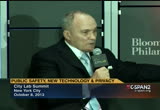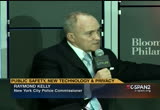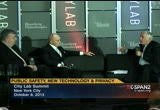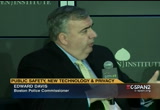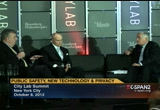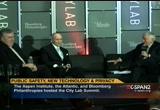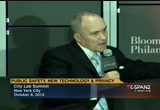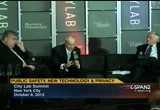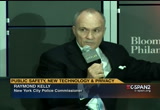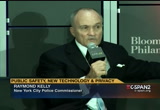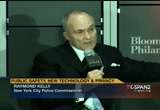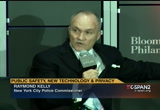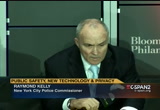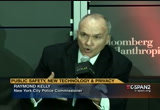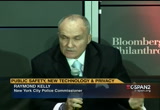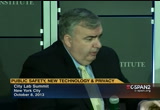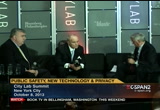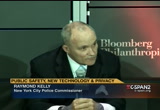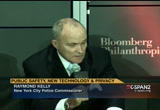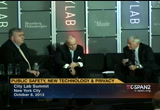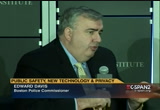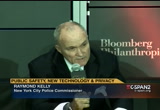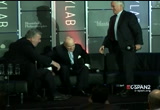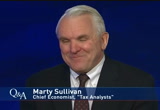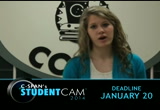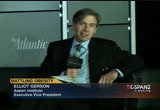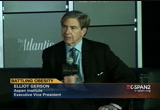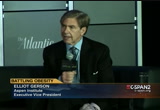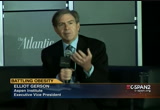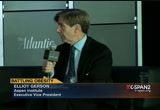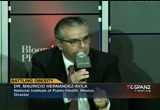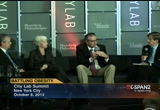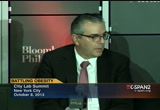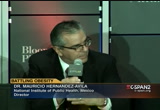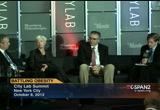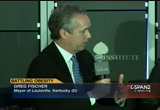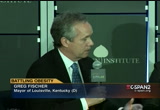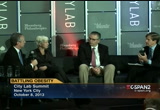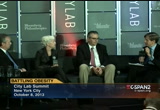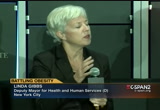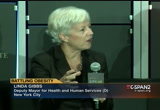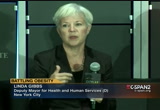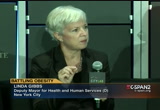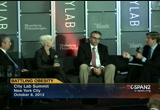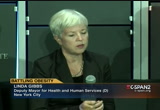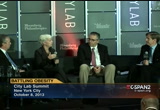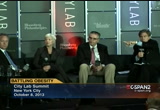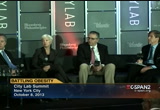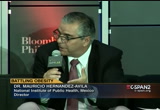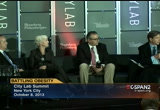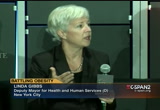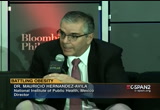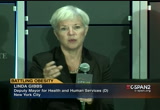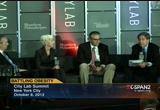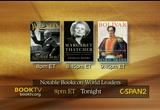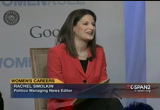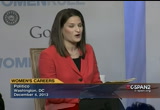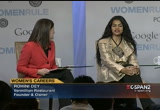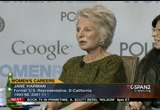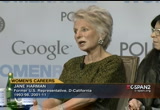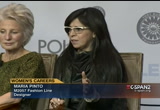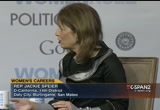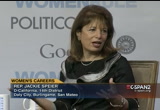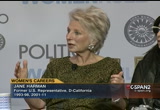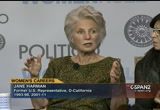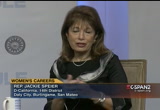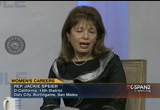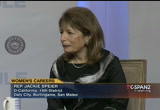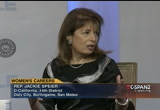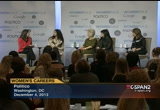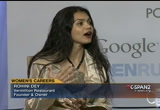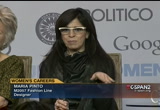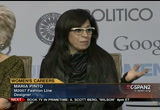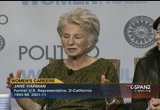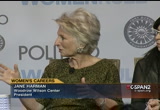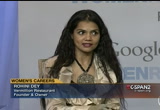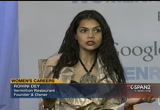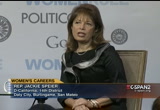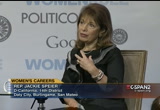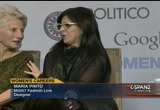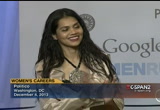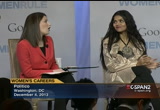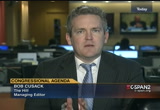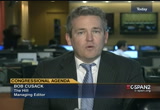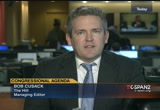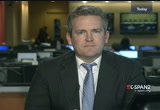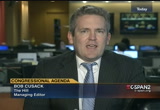tv Key Capitol Hill Hearings CSPAN January 3, 2014 6:30pm-8:01pm EST
6:30 pm
for a specific investigation of concern. we have people such as the group here will come in take a look at the equipment we have, the processes that we use, we have many community groups. we have tactical made up of leading members of the african-american community. we have a, i think, a very good dialogue as far as processes there's some friction it's not necessary lay bad thing. we work with the federal agencies every day. we get the job done in cases of
6:31 pm
-- sometime it is creates tension. it's not always a bad thing. i think you want to see behind the curtain. i think we want transparency as far as what the federal government is doing. and ed certainly has an opinion on it. but it's, in fact, there are things going on in your city then your mayor and your police chief or police commissioner should know about from the federal government. there should be a regular change . >> i agree completely. >> but ed, what commissioner kl kelly has done is expand more than most of the plaid counterterrorism unit of your own. even do interview say in new jersey, famously enough. have you learned from that? do you think you ought to expand your counterterrorism in boston so you doing things normally given to the fbi do? >> i think as it relates to home
6:32 pm
grown violent extremists, yes? i think there are people in the community we should be working with and, you know, sort of keeping an eye on. if they pose a threat. that is part of our responsibility is to keep our citizens safe. however, we need to be transparent about what we do and i don't think there's any agency in the country that is more transparent than a local police agency. we have the "boston globe" and the boston harrold in our lobby checking on what we did overnight. we have community groups march together police station every time there's a problem. there's -- it's a dynamic environment at the local level. and the mayor from portland talked about police having cameras on the eye glasses. when it happens, i it will. i will able to take my 25 investigatorrers and put them on the street. everything will be documented. >> when that happens, will you allow people being arrested to use google glass to film your officers? >> that's an important component to the conversation that nobody
6:33 pm
talked about. more of that information we're collecting right now is exculpatory. they are going to use the information to put me in prison. it's going clear a lot of people. it already has. at what point in time if you want to pursue the goal of justice. at what point in time do you stop collecting that ?fertion at what point of time do you get read rid a license plate reader collection that might clear somebody of a rape or murder charge. it cuts both ways. >> so in other words you wouldn't have problem with normal citizens video tape police at all times in their action using google glass? >> not at all. we have a court case in boston. i've sent out a directive to my officers that if anybody video tapes you it's public information you can't do a thing about it. >> one other quick thing. they created a shot spot -- is that right?
6:34 pm
video game -- [inaudible] how does that work? it's an acoustic clek device. we have microphone throughout the community listening for gunshot. when they hear a report a gunshot they try ang late the information and give you a precise location to where it happens. it's extremely effective. and saved lives in my city and lead to arrests. we have an extensively deployed. it's helpful and precise. >> open it up for questions. i'm sure there must be questions for the commissioners. >> ray, is the same true in new york about people who video tape and is it exculpatory. do you encourage citizens to
6:35 pm
tape them? >> we don't discourage them. we had some issues in the past but clearly its a public domain and can be done. we had some issues with the hot shotter. primarily the topography of new york city. hasn't been protected -- what do technology most effective coming down the pike that we don't know about? the cameras are great. the first thing police officers cois look to see if any cameras in the area as was said before in privacy panel that come way down so, you know, they're virtually everywhere. virtually. every commercial establishment. >> can you monitor in real time so you can prevent crimes that are about to happen. >> it is expensive to do that and have police officers. >> you need a human eyes to do that? can you do it -- yes. >> with artificial intelligence? >> you do some of that. we have some monitoring going on
6:36 pm
in our public housing project that is going on the limited basis. but generally speaking the cameras are used for retrospective examination. >> hi. i'm from the atlantic. how do you feel about the verdict that came down on stop and frisk? how do you think it will change new york policing moving forward? >> i didn't hear the second part of the question. how do i feel about stop and frisk? yeah. >> how do you feel about the verdict that came down within the stop and frisk and how do you think it changes new york policing moving forward? >> yeah. i'm a disabled veteran. i can't hear exactly the question. >> stop and frisk. it is a -- first of all, stop and question and sometimes frirveg -- frisk in less than half the cases is a limited pat down.
6:37 pm
cries out for appeal, i think the findings and indictment of the entire police department on something called indirect racial profiling is based on the flimsiest of evidence and information. the expert on the plaintiff side found that 6% of the stops may be unjustified. the judge herself looked at the -- or took testimony from the plaintiff in this case, i believe there were four plaintiffs and involvedded 19 stops. she herself found that 10 of the 19 stops were constitutional.
6:38 pm
the criteria that they used, in my judgment, and a lot of other people's judgment is totally unrealistic. it involved census data in a particular area. take it to the natural conclusion, we would have to stop more women. the codify law said you can stop someone in a public place when so you a reasonable suspicious is about to commit. is committing, 0 has committed a crime. that's a majority of the cases, of course. we have the most diversified police department in the world. we have police officers born in 106 countries. you know, somewhat strange that we're found to be guilty of indirect racial profiling. our department is majority/minority. and police officer rank. so the 97% of shooting victim in
6:39 pm
the city are black or hispanic, and for the -- as the perpetrators. the criteria used, as i said, goes up against the one we believe should be used and we brought in the corporation to look that the in 2006. rand said that the most appropriate criteria is determined whether or not racial profiling is ongoing is the description given the by victim of the perpetrator of violent crime. hour stops traditional about 53% african-american. so our stops are obviously -- certainly comport to description
6:40 pm
of violent crime. what we're doing in the city and alluded to it. it's working here. compare the bloomberg years the 11 years -- almost 12. 11 full years of mayor bloomberg's tenure, you compare it to the 11 years previous. you had 12,000 murders in the 11 years prior to michael bloomberg taking office. you had 5,000 murders in the subsequent 11 years. so 7,363 fewer murders in this city over that period of time. the vast majority of those lives saved are young people of color. mostly young men of color. you may or may not decide to go
6:41 pm
forward with the appeal. i believe it would be a major mistake. >> yes, there. >> i'm mayor tom battery from the city of milwaukee. following up on that. i'm curious on the thought on the mandatory sentencing for drug violence. how it works and racial ramifications of that as well. >> mandatory sentencing? >> mabd story sentencing and the gun violations and how it works in term of racial issues. >> i'm -- i don't like mandatory sentencing. i would leave it to the up to the discretion of the judge and selection process on the junction. but i'm not in favor.
6:42 pm
what happens is they let people plead guilty to attempted possession or someplace in the process well, age lot of things we're doing. i can tell you one of the most recent programs that we put in last year, year and a half is something we call crew cut. now we did it an analysis a year and a half ago, two years ago, and we dining roomed about 30% of the shoots were coming from what we call crews. these are gangs but a couple of -- these are the loosely affiliated groups. we have about 300 in the city.
6:43 pm
we put in program to take them on directly. we increase the size. we double the size of our gang division. we took advantage of the fact that they brag on social media. we have five direct attorneys in new york city, it enables us to have liaison directly with each one of the district attorney. we put a uniform component, uniform police officer in each of the precinct that has problem with crews and their -- they're there to disrupt any act of violence. obviously one of the things we're sensitive to is retaliation. this has worked very well for us. as we said before, this year we
6:44 pm
are running 25% below that. i think the professor said something he talked about 86% reduction in murders. >> we're following the same policies. we're paying attention to these, you know, the shooting are occurring among gang members. it brings us neighbors of colors. the acls looking with us right now looking at our numbers like they did in new york.
6:45 pm
the initial findings are that most of the stops we're making are among people involved in criminal activity. they have records and they are people we should be paying attention to. i find remarkable in a city where ray kelly has been able to reduce the homicide rate by 86%. the conversation is around something else other than giving him the credit he's due for what has happened here. 7,000 lives are saved over the period of time. so i just give him a lot of credit for that. yes. >> even as homicide continue to fall in new york city. traffic violence continue to be a big issue here. 148 pedestrian were killed by cars last year. there's a perception that a lot of drivers don't get prosecuted for criminal activity. do you think the n.y.p.d. could be doing a better job of prevent it on the street.
6:46 pm
how could they do it? >> we can always do a better job in every area. we have done a variety of things. we worked closely with the commissioner. i think they are doing a great job. we have just significantly changed the reformed our investigation of the practices. we have a collision investigation squad using some. we have daytime population that is over 10 million people. so you a lot of traffic. and you're going have access. and people always -- some people say that police are not arrested enough people for
6:47 pm
reckless driving. that sort of thing. you want us to make the determinations when we haven't seen -- we haven't observed the violation. it takes in-depth investigation examination, it takes witnesses, it's more complex than you might think. but -- >> yeah. technology and cameras. do they help? >> you're asking me? technology and cameras do help. we're -- we have cameras in our patrol cars now. certainly on our highway patrol cars. and, you know, we use them as a state-of-the-art technology to help our investigators got scene of an accident and do an investigation more effectively and quickly. >> last question.
6:48 pm
>> police departments -- >> can you identify yourself? >> sure. rick cole deputy mayor city of los angeles. police used to be the back water, in many ways of local government typically less educate than folks in other departments. now you're far more sophisticated in many ways than most -- between police agencies at automatic levels. how in the budget battles and your looking at the overall health of cities -- how you see beginning to plan what you do in fighting crime and in keeping cities safe with the other element that are necessary for a healthy city that in turn supports the prosperity, support the revenue, and support the quality of life that make a city safe and
6:49 pm
attractive. >> i'm -- did you get all of that? okay. good. >> that's a great question. mayor has made it clear we will work with other city department. the strength of our success in boston is the urban mechanic for great city has been based upon the fact there is connectivity between all of the various branches of government. so i know that arresting people is not going to lower the crime rate. we have arrested fewer and fewer people for the last seven years. i know, that working with the services department with the alcohol beverage control department the -- have a direct effect on crime. and the full direction of the
6:50 pm
mayor. because the mayor play an enormous role in making sure that people work together. when it happen it is can be extremely powerful. >> i say that certainly in my view there's no more innovative mayor or leader than michael bloomberg. he's done phenomenal thing here. the mayor said many times that the foundation are virtually everything that goes forward in the city. certainly anything that is progressive in nature has to be public safety. it has to be a feeling of people can walk the streets safely and that you don't have a fear of being shot in your neighborhood. he's made a deployment that. he's supportive of the police. i would say in term of priority you have some unparochial. but public safety. the staffing of police department and the support that is needed comes first. everything else falls in the
6:51 pm
place after that. in my judgment. >> thank you all. before you leave, you are both leaving office in the next foreseeable future, soon. where do you travel to go on vacation? and what is next? >> i think i'm going back to italy. my wife has made it clear we're making another trip there. the truth of the matter is, i have an offer for fellowship for harvard. i'll be doing teaching there and -- >> what are you studyinging? >> the institute of policy. >> but what subject? doctor criminal justice and policy. they haven't given me the course yet. i'll find out. >> what are you? >> a greater at walmart! all right! see you there! [applause] tonight on booktv prime time at 8:00 eastern author scott berg.
6:52 pm
we talk with her about her life and impact on the carter presidency. tonight at 9:00 eastern on c-span. we started looking at the census department data. and something strange pop out. when you look where the profit are multinational you look at the map of europe you see germany, france, ireland, italy, but if you look at the data on
6:53 pm
where the profits are, italy, france, germany, ireland. it's just all of this. sunday at 8:00 on c-span's q & a. the deadline is approaching for c-span's student cam video competition. open to middle and high school student. answering the question "what is the most important issue congress should address this year requests." with a five to seven documentary that includes c-span programming. there's $100,000 in total prizes with the grand prize of $5,000. entriesentries are due by january 020th. get more information on student cam.org. more from the city lab summit now. a look at battling obesity from
6:54 pm
the conrad hotel in new york city. this is 30 minutes. >> deputy mayor for public health and human services for the city of new york. >> welcome. we only have 30 minutes, and it's a critical topic of worldwide and literally epidemic proportion. you already have the biography of this terrific panel for those watching this live stream or later, we welcome dr. hernandez. in the city of new york. should have had her all along. and sadly, dr. tom director of the center for disease control could not be here because of the government shutdown.
6:55 pm
the very fact i have to say something like that, frankly, is still shocking. our topic is slimmer cities and promising strategies for fighting obesity. obesity is perhaps the leading public health threat in america today. cities and country side alike. it is priding globally. it's toll is huge. obesity doesn't feesly kill as directly and insidiously as fake. but leads to diabetes, heart disease, many forms of cancer, are arthritis, and countless other costly and debilitating problems. and greatly diminishes of the quality of life of those who suffer it. and we have an astonishingly high percentage of people who are obese or seriously overweight, and including populations cultures and cities where until recently obesity was
6:56 pm
not a serious problem. we have many people here from around the world. in many countries obesity is viewed as a deadly american import. it is also especially challenging problem because it is so multifaceted. unlike tobacco is difficult and we a wonderful breakout on this yesterday, as challenging as tobacco production and smoking is, obesity is far more complicated because there are so many other factors that are involved and simply say smoking a cigarette or eating a particular item of food or drinking some beverage. the physical environment is critically important. whether it's sidewalks, playgrounds, bicycle lanes. we've been hearing a lot about this at this conference. parks, even things like physical education availability in schools, youth leagues, all of these things are factor.
6:57 pm
the food environment obviously is also critical. the availability of fresh fruits and vegetables, food desserts. the presence of junk food or sugar sweet beverages, place. these things on shelves. how they appear in schools and around the community. marketing to children especially social and cultural norms. and even businesses and the practice that we are all used to effect us in some way. whether the default for meetings or conferences in our own places of work are jelly doughnuts or the kinds of fresh and healthy options we have here. i want to commend our organizers for that. while all of these many factors make the problem a more complicated and vexing one, it also gives reformers and public health activist and especially mayors many tools and levers to
6:58 pm
use. what we're going talk about today is what actually works and what lessons have been learned. i would like to start with mexico, again, because so many people around the world and this really is a global problem. for those that don't know our neighbors country has diabetes rate of almost 11%. which is higher than any country in the oecd. the u.n. just reported that close to 33% 77 mexicans are obese. which is the highest of any country in the world with more than 100 million people. and not -- consumption of sweetened sugar drinks in the world. but the new government of mexico is not only taking this very, very seriously. but there seems to be some promise that mexico will be the first country it, as i understand it, in the americas, to enact a soda tax. can you tell us about that? >> well, yes. we have been working with many
6:59 pm
-- trying to push a soda tax. with a view if we change the environment we'll be able to make more better choices of what they drink or what they eat. so these soda tax -- if you they can review the tax reform. you will see these in public health research and all the work that gone on nationally and internationally. ..
7:00 pm
>> wasn't a president of coca-cola before he was president of mexico? >> he was, but we have much more attention to our health. >> what about the argument we hear that taxing sugar beverages is progressive a height burden on poor people. >> at the end you are preventing diabetes and obesity. we are hoping this tax is going to be connected to a variety of
7:01 pm
quality water to our provision and if we connect those two then it won't be progressive. >> someone said not long ago that the incidence of diabetes is regressive too but you make an interesting point about the availability of water. and even in this country fresh drinking water is not as readily available for people and it's especially i think a problem in the developing world where in many cases people choose the sugar beverages because water isn't safe to drink. that sounds like it's an important lever in mexico, just making water more available. >> if you can drink coca-cola anyplace in the world you can drink water anyplace in the world. >> what are some of the other letters that could have been especially effective in mexico and public health measures to affect the obesity epidemic? >> well we don't have a long-term evaluation.
7:02 pm
in mexico we have focused our actions in moving away from the decision that obesity is a self responsibility. we are moving to try to change the environment so we are changing the school environment. we are changing the environment in the streets. if you go now to mexico city you will see that the streets are close so there are a lot of things that are pushing the activity. on the other hand we are also trying to make our neighborhoods more safe so people can do more physical activity. so we are focused mostly on the environment. we have also done some education to promote nutrition literacy in our children in order to increase the likelihood that they take care of their choice. we have not been very successful. for example of very effective
7:03 pm
way of changing behavior sec here in new york with the food food -- and you can make your position. in mexico we face enormous resistance from industry. >> maybe you could learn from the successes we have had with labeling here and we can learn from how you are able to actually tax sugar beverages which has been a challenge throughout this country. >> that is what i'm speaking about. >> let's move to louisville if we can, as city where i read that six in 10 are considered seriously overweight and in a state that is ranked seventh in the nation for obesity yet "the new york times" recently featured your city mayor in this story, as city tries to slim down and it's a fascinating and inspiring story. can you tell us the essence of what the strategy is in your
7:04 pm
city to attack this problem? >> well we know to be competitive in the 21st century and to have a healthy workforce we have to have a healthy workforce. three core values that tie in to the theme of yesterday and a the compassionate city where friends are helping friends and strangers are helping strangers. physical health, mental health, environmental health at the same time and underneath that health panel then we focus on issues like policy, access, activity and nutrition so we are talking about this every day in terms of putting that front in the minds of people. we have something called the mayor's healthy hometown movement that details this out and a lot of people associate that movement with this large display of physical activity that we have. 10,000 people showing up on our waterfront park to cycle through downtown streets that have been closed. 500 people doing yoga at the park or tai chi or paddling in
7:05 pm
the ohio river so our focus is to get out, be active terry d. don't have to look like an athlete to start being active and that is the hardest step for people who are old niece is to get them out and say okay i'm going to start down a path in my life so we try to encourage that in many ways. >> how wet you gotten such an incredible community buy-in to these efforts? it seems more successful than other cities? >> we have these large displays, literally thousands of people and folks say well if joe can do it i can do it and you see that with people bringing their friends or relatives so they just get out and about. i think that's part of the display and a lot of this communication as well. we talked about a lot with nutrition as well. we have a very active local food movement in our city which led us to asking the question how much local food to people want to consume? we did the first demand study
7:06 pm
for local food in the country and we found that about 750,000 people in the city may not have a matcher region and we consume $2 billion of food a year in our city end of that 300 $9 is what we call local food or local nutritious food. there's there is a demand for 800 million because we are trying to be an intermediary between the farmers and the consumers. interestingly enough study we found a lot of people like farmers markets as an upscale type of thing but if there is demand for good local healthy fresh food from all sorts of economic patterns. they want to help local businesses in this case farmers in two they see it as a higher-quality fresh or more nutritious product. >> have you done anything with the independent school district collects how have you worked with the schools in this area? >> in a real positive way. a commitment to local food
7:07 pm
components in terms of percentage of their menus, 10% right now and we have reduced the sugar and sodium components in their foods. we have increased the number of kids that are having reckless to schools and they start off with a good healthy meal at the beginning of the day as well. then there are also the health and all policies team where we take a look at all the policies we have in the city from a holistic view from transportation to education to agriculture and say, how can we be a healthier city? >> thank you and mayor gibbs new york has been incredibly ambitious in this area and does cause some firestorms along the way too. and for example that portion cap rules. we had a conversation yesterday in one of the breakouts to remembering how we use used to buy coca-cola at my age and it was a 6.5-ounce bottle. you put the nick land and 6.5 ounces and now they are available 64 ounces but even with that, with that defeat you
7:08 pm
may come back to that, the reduction has gone down dramatically and new yorkers a model for so many things we have talked about with icicles and parks and everything else. what do you think have been the most important levers that it made a difference here in new york? >> we are not done yet. we are waiting to hear whether or not our deal will be accepted on the soda size cap. >> good luck. >> exactly, thank you everybody. with our strategy in the city one of the unique things and i hear it in both mexico and louisville is that as a critical public health issue, for instance now obesity is about to pass cancer is the leading cause of preventable death in the city. it will be number one and what the mayor, who is obsessed about metrics as you have heard, what he really challenged us to do is to look not just at our public health agency for answers to
7:09 pm
this problem but to get all the city agencies together and so we asked me and my colleague who is the deputy for operations to the head and obesity task force and to really try to think across all the agencies what we could do. what came out of that was a 26-point plan that focused on reducing bad food elements in the environment, increasing good stuff in the environment, increasing physical activity and really a special focus on children. so out of that came unlikely partners in some ways. who thought the department of environmental convert -- conservation would be a big player in our obesity task force and guess what they have a lot of water. not only bottled water but propping up water fountains around the city. you will see them all the time in the parks and places where people are exercising. our schools, we adopted
7:10 pm
nutrition guidelines for the city and the schools were the first and in fact the schools started to do this work for the obesity task force and nutrition guidelines were created. so ensuring all the school meals that we serve our according to a certain nutrition standard. putting salad bars in virtually every school now has a salad bar and water jets so kids can fill up their cups and refill their cups with water. by doing this, by reaching out to all the partners in saying this is a shared goal for reducing obesity in the city we both were able to give a train for agencies to hook their car onto and a great example of that at the department of design and construction they were working on active design guidelines. what should a building look like in order to promote physical activity of folks that are in that doubling? open upstairs and create walking paths, encourage people to move during the day. the commissioner was like amen
7:11 pm
hallelujah. now i have someone to carry my initiative along and then in other cases it was that permission giving that was provided to agencies to sort of scratch their heads a little bit and say are the things that i can do? our department for the aging and in many ways working with folks like city planning and transportation said you know, we need to provide a safer path for elderly new yorkers to walk. so bringing those shoulders into the streets so that the crosswalks are more narrow, changing the timing on the lights and to think about safe walking passages. now where do we stand with all of this? we are a good ways in. not everything is off the ground yet so maybe some things need to be implemented. our most recent date just came out. adult obesity ticked up again. childhood obesity on the other hand we are seeing a five-year trend downward. i don't want to sound like a --
7:12 pm
put the ball rolling at a million miles an hour down the hill. maybe it will roll down and it will take down but it's five years in a row with kids and that's unique. that is bucking the trend nationally and internationally so that is the thing very promising. >> congratulations on that. just one general question and we will open up in a minute. i think you have all been at the vanguard of public health efforts and if you think about some of the arguments and first of all you have also touched and used all these levers that have nothing to do sometimes with regulation. but on regulation when he think of the other public-health campaigns of the century whether receipt else 40 or 50 years ago, smoking, the arguments that were used were about freedom. it's my freedom not to put on a seatbelt. it's my freedom to smoke and you hear the same thing now, it's my freedom to eat as they do in the slip or a slope arguments.
7:13 pm
if you tell me i can't drink out of a 60-ounce glass next he will tell me i can't eat chocolate or i have to eat rockaway and it's my basic american freedom is at stake but we overcame those issues with seatbelts and tobacco. are we going to overcome the same issues with obesity? >> i think that it is a battle. we have not been successful for instance, we are fighting for your cause and maybe the administration will come down and carried placards for you and get get this soda tax pass for you in mexico because that would be a great accomplishment. i'm sure others would follow but we need a first and we were not successful here in new york. thus far, we have not prevailed on the size of the sugary drinks. i think there is a combination in the balance. we try to think about how is the government you can provide information and persuade. we spend a lot of time and
7:14 pm
effort on the subway and bus platform, very graphic depictions of the consequences of drinking too many sugary beverages. just try to raise the public awareness and counter all of the advertising in the environment that suggests how much happiness you will get from doing this. so we do that but we know and really the tobacco and history is her lesson giver here. we know how incredibly powerful increasing taxes are two behaviors. even though information helps, it isn't the most powerful behavior level that we have some more aggressive actions that we can take are really needed in the face of an epidemic that is causing just tremendous social burden on individuals and great social cost to us as a whole. >> eight to think when you look 10 years back progress has been
7:15 pm
made. we are at the very beginning of this journey and we find out that place matters. the data now is overwhelming. in a city like ours in almost every city, if you let someone part your life expectancy is 68 years old and if you live in another part of town your life expectancy is 82 years old. there's a social justice that flares up and says hey what's that all about them them when you draw that down and find out obesity might he wanted the issues the next question is what causes obesity and what can i do about that? a lot of it is education and knowledge and the beginning of what's going to be a strong movement as we get to it. obviously there is conversation about health insurance and we will see this as a positive thing. >> we just have a few minutes. it's hard to see hands but i will do my best. we need to wait for microphone. just give us your name and a quick question.
7:16 pm
>> i'm from the mexico city department of transportation. just wondering if and this goes obviously to mauricio. is there work done on the relationship of the work environment and public health? it's been tapped on in places but not in mexico particularly or in america in general. there has been some of this going on in bogotá one of the few cities in one america where i've heard they have started to link the relationship between the environment and public health so i was just wondering if this is something that right now the national institute of public health is currently thinking as a means to start promoting. the biggest barrier for the active lifestyles is the fact that our cities are not built and whom much priorities given to the car. the biggest barrier is the reallocation of this space for a
7:17 pm
healthier lifestyle. >> the problem in mexico is these knowledge is still within the health -- in the sense if we move from sector to her then we can live with the transportation and the security sector and the social set there. and then connects health with security. as you might remember, we have done the major effort to recover but this was security comes, the link between health exercise was not made. we need to move to that step. and then we will get the message that the environment is a strong determinant of our health. >> if i could just add something on that.
7:18 pm
the series has been focused on megacities to a certain degree. most us the cities are like ours. half of the metro areas not real dent so you don't have as much public transportation and a lot of walking is taking place in the city so making cities like ours more walkable and likeable is a major focus of all u.s. mayors right now. >> thank you. let me go over to the side. >> i'm from new york university and you have talked a little bit about physical activity and about food and some about sugary drinks but the other piece of obesity might be also thinking about alcohol and we haven't done very much in the city at least about even basic information about what the calorie content is. we know alcohol consumption in the last 10 years went up pretty dramatically. so i just wondered if alcohol is off the table because it might be an even more scary industry to approach not only the alcohol
7:19 pm
industry but you have hospitality or if it is on the horizon and another place to think about intervening? >> who would like to take that? bea, part of the answer is you have to pick your battles and we looked at the issue of alcohol consumption. it's sort of beyond obesity. if you are talking about substance abuse the first thing that pops to mind is not let's try to do more because of obesity because there are so many of terrible social ills that come from it but in thinking about how to go about sugar-sweetened beverages, how complicated do you want your message to be, what is the cleanest and clearest path? you know it's going to get litigated so part of it is definitely weighing all the pros and cons and taking the battles. i think the next administration here in new york to finish the soda battle and sort of expanded
7:20 pm
and take that on. i agree with you. >> we have one quick question may be in the middle if there is one. right here, last question. >> this conference has been about cities and as we know cities are globally connected and the population is concentrated. i wanted to ask what cities are doing and how cities can be better prepared for that critical public health threat? >> pandemic reparation. >> well that some the same sector as the mexico is a type of coordination. we work very much with the city so they can develop their plans. we had a -- with h1n1 that show we have coordination between the federal
7:21 pm
and the local government. all cities most be prepared and certainly it's an issue. we have seen it in the last year and we will be seeing it so cities must be prepared for that >> here in new york we have a wonderful surveillance system where we get real-time feeds on the health care delivery system around what doctors are seeing and it's actually the outbreak of h1n1 in new york city. i so clearly remembered i'm sorry i'm not tom friedman and he was here this morning. he called me on a friday afternoon he said i have to shut down the pageant at the high school. i was like what? you can do that. people are in from town. he said we have seen this cluster and i can explain it but it's a serious cluster and that turned in 24 hours to be the epicenter start of the h1n1 virus. so having that kind of surveillance system and a set of
7:22 pm
protocols that is a close interweaving private hospitals public health and public safety and protocols around how to do that and using your office of emergency management, we have had plans that are exercised so that when that event actually happens people not only have a plan to turn to but they have given it a couple of dry runs. you will hear it once while in new york don't be upset tomorrow morning when you go through union station. we are planning a mass something exercise and there will be bodies but they are not really dead. they are just acting dead so that we can go through these exercises. >> thank you. i have to make a few logistical announcements and then i'm going to ask you all to thank our panel. first, the fieldtrip buses will be departing immediately after the session in front of the conrad north and avenue and i remind you that previous
7:23 pm
registration is required for those, except if you didn't register and would like to go on one the 9/11 group will be meeting on the second floor lobby and walking over. i ask you finally to please be back in this room for a 1:00 p.m. start to hear from mayor bloomberg and the candidates and let's hope very much that they continue while the great work that has been done in public health in new york and learned lessons from louisville and new mexico and with that i would like to thank this wonderful panel. thank you. [applause] [inaudible conversations]
7:24 pm
7:25 pm
windmill which is a letterpress that is found in most commercial print shops. they use it for diecutting and foil stamping and scoring cards but we use it for printing. not that many people in modern times use heidelberg's for printing because they are slower a lot of print shops are using this 40-foot long, six power press which would send out tens of thousands of prints and our. this is more for meticulous handwork doing artistic sort of printing, but it's the heart of our business. think just when you are buying something that is made with so much intention. it just has more presence like if you were sending a card to someone that hasn't been mass-produced but handled wine individual. i would hope that it would have more meaning for the person on
7:26 pm
the receiving end that it's made with love. >> there is more from bison binding in letterpress this weekend as booktv and american history tv look at the history and the literary life of bellingham washington saturday at noon on c-span2 and sunday at 5:00 p.m. on c-span3. >> representative jackie speier and former representative jane harman were among panelists who talked about women and second careers recently in washington d.c.. the topic was a focus during the panel that politicals women's rules summit three of this is a half an hour. >> we are going to get started. i am rachel smolkin the managing editor for news at politico. we are happy to have you here. i'm very excited about the next panel and we have incredibly diverse group of women who have reinvented themselves and their
7:27 pm
careers through their tenacity and perseverance. rohini dey has a masters in economics and a doctorate in management science. she left a lucrative career as a consultant with world bank and mckinsey to pursue a passion for indian cuisine and food, starting a restaurant. she is now a burgeoning restaurant here and philanthropist. she opened up her restaurant in chicago and is also an avid supporter of women in the food industry. jane harman spent nine terms in congress, rising in the ranks of the nations leading security and intelligence policy experts. she loves congress -- left congress at what some may think was the height of her career to take the helm of the woodrow wilson center as its first female director president and ceo of. maria pinto devaughn -- designed fashions for michelle obama and oprah winfrey and after closing her boutiques relaunched her latest brand m.
7:28 pm
2057 with the popular campaign on kickstarter and congresswoman jackie speier has had a storied career and her path on capitol hill. she has faced personal tragedies and experienced professional setbacks and losses and has risen above all of that to shape her agenda in congress and become a valued leader in the democratic party. so, let's get right to the conversation. this is all about second acts. how do you renew? how do you start over and whether the impetus is tragedy or an economic necessity or simply boredom. is a second path of self-discovery and how do you know if the timing is right? >> rachel how much time do you have? [laughter] that's a really good question. in my case i grew up in india and since the age of 12 my dream was clearly to save the world.
7:29 pm
at the age of 12 i remember in my school uniform crossing the street going to the world tank on a dusty hot summer day in new delhi and asking them, how do i get a job with you? much laughter and derision and they said get it ph.d. and come back which is what i did. [laughter] saving the world for upscale dining -- dining, it baffles me. with mckinsey in the middle and the last run was a combination of i would say fashion. dining out on the road with a nice expense account, travel tremendously. the world was booming when he came to food and still is. and a combination of wanting to go entrepreneurial and finally it was rage.
7:30 pm
i was furious at the indian options out there. all you can eat, $8.99. come on, you know. the complexity is tremendous so surely we can do what -- has done for japanese or others have done for korean and now french and italian. so this is what drove me to take the plunge from the frying pan into the fire. >> congresswoman? >> well i are ready where her clothing. come on guys, let's support our sisters. i think it's a couple things. it is about early dreams and that is my story too meant. i grew up in los angeles, a public high school -- early boyfriend and when to the convention in the early 1960s
7:31 pm
the age of your great-grandmother's and was there on the floor of the convention when john kennedy was nominated for president. my personal lightbulb went off and i just knew i wanted a career. it took me 32 years to run for congress. the first elected office i sought since junior high school treasures since i lost but i have had at least three careers already because i was a congressional aide for a long time. i worked in the carter white house. i was in private law practice which was for me really boring. then i ran for congress, served for nine terms and left after my third term to run for governor of california which i lost got talked into coming back to congress and served another five germs and then left because the opportunity to be ceo of the wilson center was absolutely enormous. i succeeded a well regarded former member of congress. it's extraordinary. it's a big international stage and i'm very interested in international issues.
7:32 pm
the only other thing i would say about all of this is i see life as a journey. there are many stops on the way. where you go with this journey is up to you. you can't buy it. your mother can give it to you. your kids and i have four of them, certainly inspire you and grandkids are much better than kids by the way. but you have got to go there and you have to have the passion and drive to go. this may be my fourth or fifth career. i'm planning on at least five more. [applause] >> maria. >> first i want to challenge the word reinvention. i think it's really more about evolution and i like your perspective in terms of it's a journey. i think that my career has just been an evolving process of what we have learned and what we bring to the table today. so as a designer today i can embrace things in a much different way both as a designer
7:33 pm
and as a woman and looking around this room and saying, what do we need which brings more relevance to what i would consider doing now. so that's my first challenge. for some reason i always get twitchy when i hear reinvention because it sounds like you're doing something to fix something as opposed to building on something that you a party invested so much of your life into. to your pointed always goes back to passion and drive. i always wanted to be a designer and i kept for five lives ready. how many lives does a cat have? >> you have to lease double the number. congresswoman speier. >> the first thing i would say is throughout the plan because it's not going to go the way you expected to go anyway so no need to waste any time thinking about what your future's going to look like. much like jane, i have had many losses. i have what i would like to say
7:34 pm
a three-time loser. i lost the student body president in high school. i lost the first time i ran for congress in 1979 and i lost when iran for lieutenant governor of california in 2006 when i thought it was going to be the first woman to serve in that role. but every time i lost, i found out that i had really one because it set they have to do something even more extraordinary than i thought i was going to do. so, i would say that there is not just a second acts. there are many many acts and do not combine yourself into thinking that you have to find out that the perfect job is for you. because they are going to be many perfect jobs and that imperfect job come the job that you hate, is going to teach you so much about what you really want. >> i think that's a great way to put it and i want to go back to a point that congresswoman harman made.
7:35 pm
i like the concept of a journey. how do you know when it's time to take the journey? do you stand in place for a while and when you take that next step? >> are you asking me? >> i am. >> well everybody in this room needs to be fierce. do you understand this? you need to fight for what you want. there are different ways to fight. fighting doesn't eisen in kicking somebody in the face. it can be a kinder gentler and even more effective way to get what you want. but jackie is right. failure is your friend. i failed a number of times professionally and i also had personal loss which jackie has had too and maybe others of you have read right after i took the wilson job 90s and, this was two and a half years ago my husband was diagnosed with acute myeloid leukemia. don't do that. he died in a month. it was just a riddle but i kept going. you know when the time is when
7:36 pm
you know. i don't know how to say that great i think it's true that being in the wrong job can teach you what you don't like and being in the wrong job sometimes is useful to prove yourself to get a better job. but i'm looking around this room be fearless, do it. think about what you really really want to do. if you don't like what you're doing, check out other things. one other piece of advice which you probably know, it's much easier to get a job from a job. don't just quit. don't sit on your bed and say i need a job, somebody do something. it doesn't work like that. you will have to sometimes bide your time and especially if you're raising a family sometimes you have to bide your time. i don't mean quit again that it's hard. when i had four kids at home it was a really hard thing to juggle all of this and when i finally ran for congress two of them had -- one was in college and one was on a school year
7:37 pm
abroad program so was more manageable but one last point about this with the life balance and work talents thing. one night i called home to tell my then 9-year-old daughter, my youngest who is now 29, she survived me. she is not a drug dealer and she is very happy and beautiful. it i said justine i can come home to put you to bed because i have to stay late to vote. her immediate comment was mommy, why is staying late to vote more important than coming home and putting me to back? >> what the to say? >> i have been answered that question 20 years later. if anyone knows the answer i would be interested to hear it. >> may i just suggest something about that though? all of you probably at one point or another in your life want to have a family. it took me a long time to have my first child. i was 38 years old and then i had a couple of miscarriages one at 17 weeks, and it was very
7:38 pm
tough. then we adopted a baby and the birth mother 10 days later took the baby away. i'm crying and coming home and saying to my husband why to these things keep happening to us? he said wait a minute, we have this beautiful son and we have each other and we have our health. so i go to the fertility specialist who says to me in a kind way, based on the age of your eggs -- [laughter] and your medical history you have a 10% chance of getting pregnant in vitro. well, that sounded like bad odds so we closed that chapter and grateful to have our son. i started running for secretary of state and that time of the month came and went and came and went and came and went and finally at 11:00 at night i ran a to walgreens to get a home pregnancy test. i come back and take it and it's
7:39 pm
turning the right color for the first time after doing that hundreds of times. i called my husband that i said i think i'm pregnant. he said what was it, immaculate conception? [laughter] sure enough, he was in er doc and i went to the hospital and got the blood test and he calls me at 7:00 a.m. in the morning and he said you know, you are pregnant. i got pregnant naturally at 42. [applause] so don't give up hope. the sad part of that particular story was that two weeks later i announced i wasn't running for secretary of state any longer because it was a very high-risk pregnancy because of my two miscarriages before. two weeks later my husband was killed in an automobile accident. and i was then a single parent with a 5-1/2-year-old, pregnant with her second child and my
7:40 pm
husband who was a remarkable guy was an er er doc and they live in the moment. he led his life insurance lapse so i was three months from personal bankruptcy. >> and you had third, fourth and fifth ads. >> i frankly wanted to die. i think that i would sit and it was a high-risk pregnancy so i was at bedrest for part of it. i remember my dad who was this big dramatic guy coming to visit me one day. i said dad, i just don't know if i can go on with this. i miss steve so much and this pregnancy. he looked at many said jackie it's been three months, get over it. tough words. but imparts that so we have to do. whatever it is that comes our way that is painful or traumatid of get the wherewithal
7:41 pm
internally and surround ourselves with family and friends to help us get through those hard times. you have to be willing to ask for what you want. you know, after losing my husband, he was -- it was tough and people didn't want to hear me talking about a three years later but i was still in a lot of pain. i found ways of creating a universe of people around me who were of like mind. we called ourselves the merry widows. no one wanted to join that club. babil the friendship of women who even today get together three or four times a year to support each other. so developed that universe of people who can help you. >> you were not in a situation where circumstances had imposed a change on you. you are at a job earning a lot of money. why make that change?
7:42 pm
did people think you're crazy to do it? >> i want to write a book on this. it is ridiculous especially when you come from an indian background and you have a ph.d. and a brand-new career to go back to a small business. all of those restaurants. it's appalling. i think my parents what i will wish they would come back to sanity. you know, i worked at mckinsey and i worked at the world bank and so i had eaten out a lot. man, was i in for a journey. but what i would counsel to anyone who is looking to go, and for me there are people that live in different ways and i tried. i get my energy from that. a little bit of insecurity and fear and push and so for me i
7:43 pm
didn't just go into mckinsey and say all right. i took a couple of months to really invest in myself. we call it early immersion. we used to do it at mckinsey. i spoke to positive people who would speak to me, owners, operators and managers. i lived with the restaurants here. i spoke to bankers, iran my business that i wanted to convince myself, is this viable conceptually and financially? it's not philanthropy. i'm not in a career for just ego ego -- if you will. it's only after i did those three months, still it taught me very little. i so miss having a chart. legal, travel, corporate. one day when i get to the empire i will get all that back. it's been such an amazing journey, hugely gratifying and i
7:44 pm
strongly endorse it. making that change whether you call it the second act, renewal or evolution. >> we will call it evolution as it evolution as i go to maria. you are in a position where you had your dream job and everything was going so well. then because of the economic downturn you had to step back and rethink everything. how do you not let fear hold you back in a situation mike back? >> i think you have a point where it just sort of tells you have to move on. to your point you surround yourself with really dynamic and strong people. of course you don't make any of these major life decisions without consulting and gathering of information. it's not easy. it's easy to sit here and talk about it. when you're in that space that gets really dark and scary and then you just have to find you no whatever you want to refer to
7:45 pm
whether it's in your soul or your network of friends. there's a pragmatic side and the emotional and spiritual side. all comes together to movie to the next place. it's absolutely not easy but i have absolutely no regrets. the best thing that ever happened was that i close my company in 2010 and that gave me time to breathe and i was able to do consulting work and gather new information which is informing what i'm doing now is so much more interesting and so much more dynamic. i have absolutely no regrets at this point. did i not have three years of a big rollercoaster ride? absolutely but if i were to advise someone i would say take a leaf. there's always something better on the other side. you don't know what it is but you have to have faith and you have to have faith in yourself and courage. it's always scary. when his nets gary? look around the room. coming here today brought some theory. what's going to happen? there's always fear in what we
7:46 pm
do. when you don't have that sounds of call it a thrill or whatever you want, the emotional kind of drug and that is what sort of drives you to the next place. i lived publicly on the edge a lot more than most people i know i don't know, they respect me but at the same time they know i'm a little crazy but you have to be. otherwise it's boring. i have absolutely no my -- regrets. my life has never been warring but it has definitely been scaring. i've had great experiences. >> could i had one thing that hasn't come up that matter so so much in that as women supporting women. a lot of what jackie is talking about -- [applause] this network of women supporters. when my husband died one of the first people to call me was jackie and she sent me this lovely book and it reckless and we talked about it. >> what the was the book lacks. >> this is not the life i ordered.
7:47 pm
>> yeah, a beautiful book and a beautiful gesture. not all women thought i would share this secret with you. as madeleine albright says, there's a cold place in hell for women who don't support women but all of our careers here and a lot of viewers will depend on women mentors and support groups of women, not just your families although there may be strong women and their families but use those support networks but also do it yourself. pay it forward. it's so important that you become the mentors and the people who inspire younger women who are wondering whether they can get out of their comfort zone. i got there were strong women in your life who maybe didn't do this crazy things as you did but who may be in your own family got out of got out of their comfort zones. you said your parents would probably be appalled that i'm sure there were other people who you saw out there even in india
7:48 pm
who were role models for at least the kind of journey you wanted. >> i think the role models don't necessarily have to be women. i think men can be incredibly helpful but it's up to us to reach out. i totally agree with your point. in our case in culinary i'm glad you brought it up and i was having a conversation with rachel earlier that the statistics for leadership of women in culinary when i talk about leadership and talking about being restaurant tears, restaurant magnets. it makes the senate look like hallelujah. truly, it makes it look fabulous. in schools enrollment by women is a little over 50% but when it comes to winning awards and these lead positions, well below 10% by any statistic even as low
7:49 pm
as 3%. i am now on the board of trustees of the james beard foundation and making a concerted effort. i have cofounded a scholarship with them to literally build leadership. it's not more education grants. it's not more scholarships. you don't need more education. it's about giving one-year accelerated entrepreneurial entrepreneurial unless you can do your finances and balance sheet and invested capital p&l, talk the language, management and running an entire kitchen. we are rolling that out across different shifts and hoping to build a groundswell of change in the industry. why is it important? not because i want my daughters to be restaurant tears. god forbid, but women need to own half the sky, ride?
7:50 pm
so why not? >> i want to pick up on congressman your story. you shared some personal tragedy with us but there was other. you were shot five times at jamestown trying to rescue -- and you were left for dead. give us a sense of how you come out from an experience like that. you have talked about surrounding yourself with good friends but what do you draw from yourself to go forward? >> i was 28 years old when that happened. i was the legislative counsel to congressman neil ryan and there was a cold, although it was called the church called the people's temple. 900 members along with their reference jim jones went to south america to guyana to set up a commune there. many of congressman ryan's constituents were concerned about their loved ones, young
7:51 pm
adults often, who they felt were subject to mind control and cut themselves off from their families. we made a trip down there. many people wanted to leave. on the airstrip unbeknownst to us a tractor-trailer had followed behind us with seven gunmen on it and shot and killed congressman ryan who was shot 45 times and a number of members and i was shot five times on the right side of my body. i've got to tell you at 28 thinking oh my god this is it. i'm not going to live to be 85. i'm not going to get very to have 2.5 kids. this is it. when you have moments like that in your life, it kind of puts everything in perspective. i just made a commitment to myself that if i could live, if i did survive that i would never take another day for granted,
7:52 pm
live everyday as fully as possible and commit myself to public service. i am one of those who literally have had a couple of lives and very lucky to be here as i think we all are. [applause] >> i see and that's a wonderful note to close on and i am being given signals that needs to happen. before we do, maria i promised my daughter who wants to be a fashion designer that i would ask you a question from her which is, what will your next line the like and do you think it will be a big hit? [laughter] >> 100% because how many women are in this room? i promised to go look at my web site m. 2057 by maria pinto. you said something earlier and i do appreciate having mentors and if i didn't say i thank them, member --
7:53 pm
mentors that have been men and friends that have been men that have supported me but i do recognize and appreciate what you said earlier in terms of women supporting women. and it's our responsibility. i just got off of a call this morning. i launch my new collection on kickstarter which is a really cool platform. this woman e-mailed me and she said i'm launching a project. do you have time to speak with me as i have had many of those and i try to respond to all of them because i know in five minutes i can share some insight it's easy to say it and it's another thing to make the time to do it i know it's our responsibility. >> i will tell you, you gave a fabulous dancer. why don't i have each of you give me a one sentence closing thought, anything you want to wrap up on or that you didn't get to and he wish wished we would have? >> i'm at a loss. >> my daughter justine the one who i disappointed profoundly 20 years ago is now a beauty and
7:54 pm
features editor at al.com. she is my resident fashionista and she will be really impressed. [laughter] >> i just want to thank all of you. i'm always inspired by the women and i've been lucky to meet these wonderful women on the panel today and thank you for allowing me to be here with you. >> thank you. >> i too am delighted to be with this group. i always like to end with his quote his life should not be a journey with the intention of arriving in a well preserved body but rather be totally used up, totally worn out, chocolate in one hand, martini in the other screaming yahoo!, what a ride. [applause] >> rohini it's your turn. >> i have come up with nothing profound but who can beat that?
7:55 pm
except a rum and coke in my case. it's a pleasure to be here. i really hope all of you pursue your dreams. it is about that and as long as there is passion, it's worth the ride. and i want to comment, what a lovely morning. >> you bob cusack is managing editor of the hill. the senate returns monday for a procedural bill that would extend employment insurance. who is sponsoring this bill and how long is the extension and what is the likelihood it will get passed? >> dean heller's bipartisan bill republican from nevada as well as jack reed democrat from rhode island joined forces to extend these benefits for three months that expired on december 28. the question is, does that have to votes to pass? there hasn't been any additional public support that has come out just yet. harry reid the majority leader strongly supports this and is hoping to put pressure on their republican-led house to pass
7:56 pm
this. he first has to get the votes so roughly if democrats are going to need at least a handful of republican votes and it remains to be seen if they are gone to get those votes. >> the senate has a vote coming up monday at 5:30 on the nomination of janet yellen. what is her support coming from in the senate and how did the recent changes in the so-called nuclear option affect this bode? >> yellen does have votes. before they went out -- on breaking there is a procedural vote on her she got 59 votes and that is cleared the way for this vinyl vote. that is where the nuclear option played into effect basically that she didn't need the 60 that she needed a majority. yellen got 59 votes in a procedural motion she's expected to pass with within committee. there's only one democrat joe manchin who voted joe manchin who voted no in three republicans voted for her in committee so we may see a mixture. most democrats are certainly going to support her and there
7:57 pm
will be some republicans about her. >> the house is back next week with at least one vote on the health care law. how is this so different from others at the house is taken? >> it's a new year and it's obamacare is. this is different because it's not an obamacare repeal bill that we have seen dozens of times from house republicans. this bill would mandate that the federal government tell those whose data has been breached or there has been some security problem with their personal information who signed up for the affordable care act. the obama administration is come back and said that is no once security or private information has been breached. republicans in congress have held hearings on this. they have heard testimony from experts who say that the security of the site is not strong. very outspoken on this has been mike rogers a republican from michigan. >> the houses gaining a new member and one is officially leaving.
7:58 pm
talk with us about that creates the bradley byrne ob replacing jo bonner who stepped aside. byrne won a special election and he won the general election after congress had adjourned so that is why he hasn't been sworn in. he will be sworn in. mel watt is, his last day will officially be january 6. he has been cleared to join the fhfa housing agency. that was a nomination that really needed the nuclear option to happen because it didn't have the necessary votes from republicans to clear. after the nuclear option was deployed he was confirmed by the senate so there'll be a special election for his race once after he steps down. we are not sure when the special election happen. >> beyond the house and senate lawmakers are working on a spending bill to keep the government operating after january 15 after the continuing resolution expires. what is the status of that? >> they have been working over the holidays and hoping -- helping democrats to put in
7:59 pm
language that will keep funding the government facing the january 15 deadline and the spending level is just over a trillion dollars. we have agreed to in the ryan murray deal before the holidays but now they have to pass it at appropriations bill with enough favor from republicans and democrats. they have been working behind the scenes to craft that language that would fund the government in a massive omnibus and of course that will be the question of when they will come out with that bill and does that have the votes to pass? it should because of the ryan murray budget deal but we will see. >> anything else we should look at as the second session is getting underway? >> i think immigration is going to be a big issue. certainly the first three months of the year. some are are concerned that speaker john boehner is going to move subtype of immigration bill. that remains to be seen but he did higher a former john mccain aide and proponents of immigration reform like that. so it remains to be seen what's going to happen there and also
8:00 pm
interesting to see what boehner is going to do on the extension of unemployment and it fits. we are in an election year so both parties have gone into campaign mode and we will see that morrissey or the sun. >> you can find bob cusack's work at dell.com and on twitter at bob cusack. thanks for joining us. >> thank you. ..
70 Views
IN COLLECTIONS
CSPAN2 Television Archive
Television Archive  Television Archive News Search Service
Television Archive News Search Service 
Uploaded by TV Archive on

 Live Music Archive
Live Music Archive Librivox Free Audio
Librivox Free Audio Metropolitan Museum
Metropolitan Museum Cleveland Museum of Art
Cleveland Museum of Art Internet Arcade
Internet Arcade Console Living Room
Console Living Room Books to Borrow
Books to Borrow Open Library
Open Library TV News
TV News Understanding 9/11
Understanding 9/11